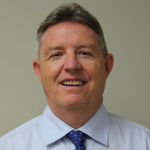Don’t Get Mad, Get Moving

28 September 2017 at 8:34 am
Many people still believe if a disability isn’t visible it doesn’t exist, writes Bill Gamack, CEO of EPIC Assist, as he reflects on the fallout of the “Ashy Bines’ saga.
Gold Coast fitness guru Ashy Bines recently made headlines when she parked her car in a disability parking spot, later defending the move as acceptable because, “her gym has no members with disability”.
After a moment of disappointment, I considered Ms Bines’ statement and realised she is by no means alone in her assumptions around disability.
The reality is, many people still believe if a disability isn’t visible and obvious to the passer-by in the street, it doesn’t exist. And that’s a problem.
I don’t believe there was any ill-intent behind Ms Bines’ comments, but there is certainly an opportunity for her words to act as a catalyst for conversation, so we may all become more educated and informed.
The truth is, disabilities can be both visible and invisible. Disabilities are not black and white; even people with the same disability can have vastly different experiences. A disability can be something that a person lives with all day every day, or something that can affect them in different ways at different times.
Saying “no one here has a disability” is particularly problematic, especially as many people with invisible disabilities choose not to disclose for fear of becoming the object of damaging stereotypes.
Ms Bines has a significant public platform for disseminating her messages, as do many other individuals in the media spotlight. And the issue is, when influential people make uninformed assumptions and comments, people listen.
We live in a time when words and phrases like “wheelchair-bound”, “suffering from” and “victim of” are still commonplace in the media. That needs to stop, now. These words serve to perpetuate the narrative that people with disability should be pitied. It says people with disability are always going to be at a disadvantage, never able to achieve as highly as others. And that’s just not true.
It’s up to everyone to educate themselves, and make sure they are part of moving society forward and levelling the playing field for people with disability. There is no shortage of resources and voices out there that will happily help you on this quest.
I’ve seen a lot of blame and shame in this whole “Ashy Bines saga”, and I do understand where people are coming from. But rather than getting mad, let’s get moving.
Let’s get moving on an educational journey to demonstrate that disability comes in many forms. And most importantly, demonstrating that disability does not mean “less”, it just means different. And different is good.
About the author: Bill Gamack has been CEO of disability employment not for profit EPIC Assist for four years, and is passionate about helping people with disability secure meaningful, sustainable work. Bill also has family experience with disability, and understands the challenges faced by participants and families in seeking the services needed to achieve success.









Blue disable label epidemic. The blue disable label is specifically for those disable people that require better access to the vehicle they are using for transport. I myself require my door to be fully open to get in my vehicle. My right foot and leg have completely no movement. But I’m not in a wheelchair and I feel bad if I displace someone worse off than me. That said, it really irks me when I see someone park in a disable park, hop out of their car and run up the stairs wearing high heal shoes. Yes, this person does have a label, her disability maybe invisible, but does she really need the extra space to access her vehicle. At my daughter’s school, we have 1 disable park and about 8 vehicles with disable labels. In my opinion about 80% don’t need the extra space to access the vehicles. But it seems doctors are willing to fudge the applications and council are handing out labels like candy. I think they should tighten the access to labels through something like the NDIS, or restrict the parks to disable people with actual wheelchairs. I would rather miss the parking spot then demean someone’s disability as irrelevant. If you care about people including the disable then you respect their right to access, but you also need to respect the needs of the disability because anyone can become disable tomorrow. It only took me seconds to go from super fit to disable. I would rather the park sit vacant then be abused by someone with a lack of respect for the disable, and I pray they never should endure those few life changing seconds I did and actually need the park legitimately.